英语学习资料1
- 格式:doc
- 大小:32.50 KB
- 文档页数:8
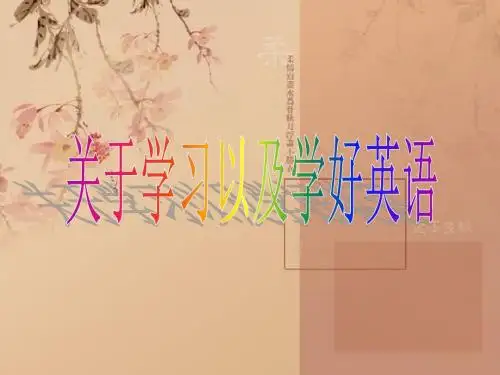
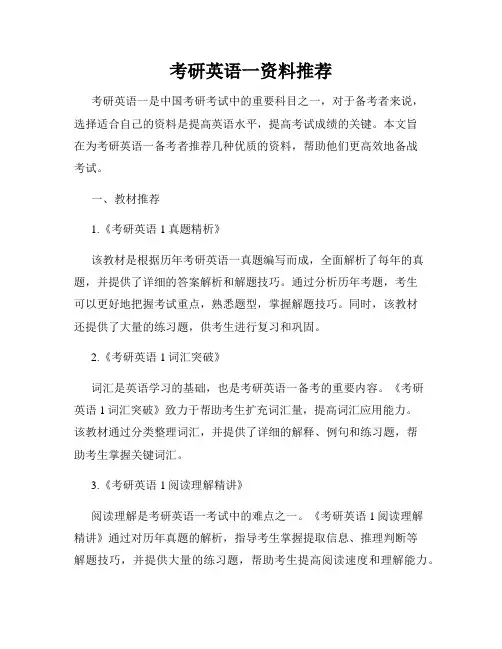
考研英语一资料推荐考研英语一是中国考研考试中的重要科目之一,对于备考者来说,选择适合自己的资料是提高英语水平,提高考试成绩的关键。
本文旨在为考研英语一备考者推荐几种优质的资料,帮助他们更高效地备战考试。
一、教材推荐1.《考研英语1真题精析》该教材是根据历年考研英语一真题编写而成,全面解析了每年的真题,并提供了详细的答案解析和解题技巧。
通过分析历年考题,考生可以更好地把握考试重点,熟悉题型,掌握解题技巧。
同时,该教材还提供了大量的练习题,供考生进行复习和巩固。
2.《考研英语1词汇突破》词汇是英语学习的基础,也是考研英语一备考的重要内容。
《考研英语1词汇突破》致力于帮助考生扩充词汇量,提高词汇应用能力。
该教材通过分类整理词汇,并提供了详细的解释、例句和练习题,帮助考生掌握关键词汇。
3.《考研英语1阅读理解精讲》阅读理解是考研英语一考试中的难点之一。
《考研英语1阅读理解精讲》通过对历年真题的解析,指导考生掌握提取信息、推理判断等解题技巧,并提供大量的练习题,帮助考生提高阅读速度和理解能力。
二、参考书推荐1. 《剑桥雅思1-14真题精讲》雅思考试是国际英语能力评估系统,与考研英语考试难度相当。
《剑桥雅思1-14真题精讲》系列是一套经典的雅思考试辅导教材,通过对雅思真题的解析,帮助考生了解国际英语考试的出题思路和难度,提高阅读、听力和写作能力。
2. 《新东方·久雪考研英语一阅读理解》新东方一直以来都是备考者的首选机构,他们出版的《久雪考研英语一阅读理解》是备考阅读理解的良好参考书。
该书通过列举各种类型的题目,为考生提供了大量的练习机会,并针对每个难点提供了详细的解析和解题技巧。
三、网课推荐1. 网易云课堂网易云课堂是国内知名的在线学习平台,提供了大量的考研英语一在线视频课程。
考生可以根据自己的需求选择不同难度和内容的课程,通过网上学习和在线辅导,更好地备考考研英语一。
2. 慕课网慕课网是国内最大的在线教育平台,也提供了许多考研英语一相关的课程。
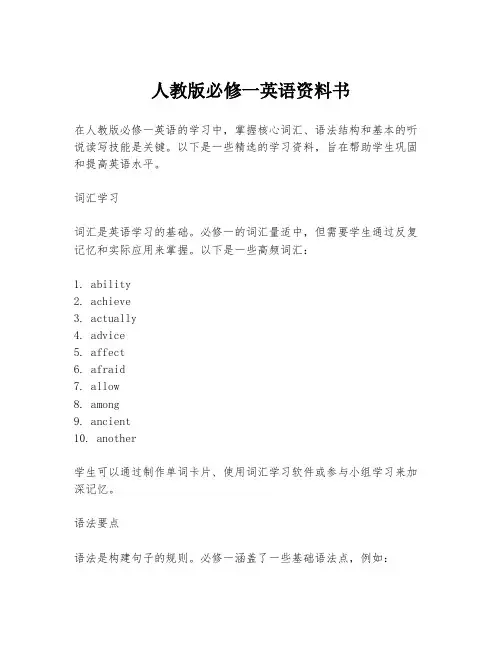
人教版必修一英语资料书在人教版必修一英语的学习中,掌握核心词汇、语法结构和基本的听说读写技能是关键。
以下是一些精选的学习资料,旨在帮助学生巩固和提高英语水平。
词汇学习词汇是英语学习的基础。
必修一的词汇量适中,但需要学生通过反复记忆和实际应用来掌握。
以下是一些高频词汇:1. ability2. achieve3. actually4. advice5. affect6. afraid7. allow8. among9. ancient10. another学生可以通过制作单词卡片、使用词汇学习软件或参与小组学习来加深记忆。
语法要点语法是构建句子的规则。
必修一涵盖了一些基础语法点,例如:1. 一般现在时和一般过去时的使用2. 现在进行时和过去进行时的构成3. 情态动词的基本用法4. 简单句和复合句的结构通过练习造句和改错,学生可以更好地理解和运用这些语法规则。
听力训练听力是语言学习中的重要部分。
学生可以通过以下方式提高听力技能:1. 定期听英语歌曲,尝试理解歌词内容。
2. 观看英语电影或电视节目,注意听力材料中的语音和语调。
3. 利用在线资源,如英语听力练习网站,进行针对性训练。
口语实践口语能力的提高需要大量的实践。
以下是一些口语练习的建议:1. 与同学进行英语对话,模拟真实场景。
2. 参与英语角或语言交换活动,与母语为英语的人交流。
3. 录制自己的英语口语,自我评估并寻求改进。
阅读材料阅读是提高语言理解能力的有效途径。
学生可以通过以下方式提升阅读技能:1. 阅读英语课本中的课文,理解文章主旨和细节。
2. 阅读英语报纸和杂志,拓宽词汇量和知识面。
3. 尝试阅读简单的英语小说,提高阅读速度和理解力。
写作技巧写作是表达思想和信息的重要方式。
以下是一些写作练习的建议:1. 练习写日记或短文,记录日常生活和感受。
2. 尝试写作不同类型的文章,如议论文、说明文和叙事文。
3. 学习并应用写作中的衔接词,使文章结构更加清晰。

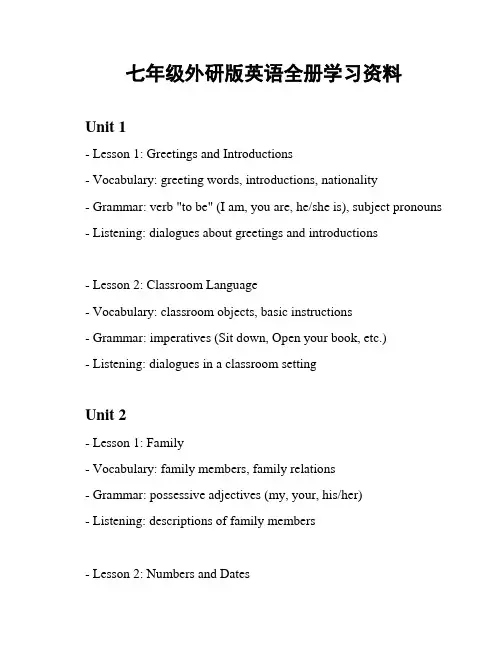
七年级外研版英语全册学习资料Unit 1- Lesson 1: Greetings and Introductions- Vocabulary: greeting words, introductions, nationality- Grammar: verb "to be" (I am, you are, he/she is), subject pronouns - Listening: dialogues about greetings and introductions- Lesson 2: Classroom Language- Vocabulary: classroom objects, basic instructions- Grammar: imperatives (Sit down, Open your book, etc.)- Listening: dialogues in a classroom settingUnit 2- Lesson 1: Family- Vocabulary: family members, family relations- Grammar: possessive adjectives (my, your, his/her)- Listening: descriptions of family members- Lesson 2: Numbers and Dates- Vocabulary: numbers 1-100, days of the week, months of the year - Grammar: counting numbers, ordinal numbers (first, second, etc.) - Listening: conversations about dates and numbersUnit 3- Lesson 1: School Life- Vocabulary: subjects, school facilities, activities- Grammar: present continuous tense (I am studying, he/she is playing)- Listening: discussions about school life- Lesson 2: Leisure Activities- Vocabulary: hobbies, sports, leisure activities- Grammar: can/can't (I can swim, he/she can't dance)- Listening: conversations about leisure activities... (continue with the remaining units and lessons) ...ConclusionThis document provides an overview of the learning materials covered in the 7th-grade textbook of the "Foreign Research Edition" English course. Each unit consists of two lessons, focusing on different topics, vocabulary, grammar, and listening exercises. The document serves as a helpful guide for students, teachers, and parents to understand the content and structure of the course.。
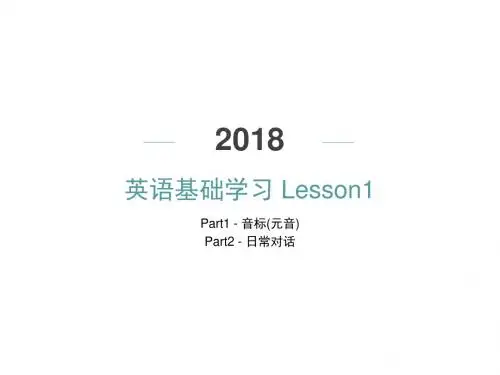
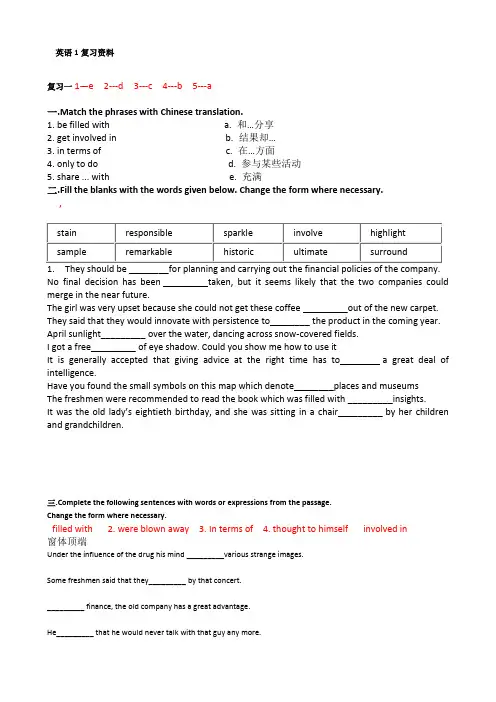
英语1复习资料复习一1—e 2---d 3---c 4---b 5---a一.Match the phrases with Chinese translation.1. be filled with a. 和…分享2. get involved in b. 结果却…3. in terms of c. 在…方面4. only to do d. 参与某些活动5. share ... with e. 充满No final decision has been _________taken, but it seems likely that the two companies could merge in the near future.The girl was very upset because she could not get these coffee _________out of the new carpet. They said that they would innovate with persistence to________ the product in the coming year. April sunlight_________ over the water, dancing across snow-covered fields.I got a free_________ of eye shadow. Could you show me how to use itIt is generally accepted that giving advice at the right time has to________ a great deal of intelligence.Have you found the small symbols on this map which denote________places and museumsThe freshmen were recommended to read the book which was filled with _________insights.It was the old lady’s eightieth birthday, and she was sitting in a chair_________ by her children and grandchildren.三.Complete the following sentences with words or expressions from the passage.Change the form where necessary.filled with 2. were blown away 3. In terms of 4. thought to himself involved in窗体顶端Under the influence of the drug his mind _________various strange images.Some freshmen said that they_________ by that concert._________ finance, the old company has a great advantage.He_________ that he would never talk with that guy any more.If you_________ the controversy (争论), you may burn your fingers.四.Choose the right word from the brackets to fill the blanks.2. responsibly3. incredible4. diversityThere are some _________places in this area, which attract tourists every day. (historic They trusted Stephen to behave_________ while they were abroad.(responsible That’s the most _________coincidence (巧合) I’ve ever heard of! (incredible diversity definite 一1—e 2---d 3---c 4---b 5---adeliberate a. 悲惨的hollow b. 偶然碰见obstacle c. 障碍,妨碍stumble d. 中空的tragic e. 故意的二. Fill the blanks with the words given below. Change the form where necessary.1. accomplish2. Ambition3. obstacles4. dominates5. seemingly6. vision7. solutions8. releasing9. individuals10. ideal2. _________is the desire for personal achievement. It provides the motivation and determination necessary to achieve a particular end or condition.3. Women today have the chance to pursue their own careers, but still have to overcome many_________ to gain real equality.4. That school _________in baseball. This has been the third time they have won the National Youth Championship in the 21st century.5. There is_________ nothing we can do to stop the plans from going ahead. But we can at least prevent the situation from getting worse.6. _________is the desire for personal achievement. It provides the motivation and determination necessary to achieve a particular end or condition.7. Women today have the chance to pursue their own careers, but still have to overcome many_________ to gain real equality.8. That school_________ in baseball. This has been the third time they have won the National Youth Championship in the 21st century.9. There is_________ nothing we can do to stop the plans from going ahead. But we can at least prevent the situation from getting worse.10. There is_________ nothing we can do to stop the plans from going ahead. But we can at least prevent the situation from getting worse.三. Complete the following sentences with words or expressions from the passage. Change the form where necessary.三on 2. seek out out with with窗体顶端Researchers have_________ a drug that may help patients with Parkinson’s disease. This may be one of the great discoveries of the century in medicine.There are so many applicants. How can we______ a really good person for the job?Does everyone know what to do if a fire_________ This question should be asked often.4. It was my daughter’s birthday and she invited several of her good friends to the party. The air was_________the sound of children’s laughter.5. The festivities _________a huge fireworks display. Following that, there would usually be dance parties or other activities.四. Rewrite the following sentences, replacing the underlined words with their synonyms you have learned in this unit.四1. employment 2. opportunities 3. advantages 4. expenses5. accommodation(s)1. Most of this year’s graduates of our university have found jobs. ___________Your new job provides you with a lot of chances to travel around the world. ___________We should not always consider our own gains first. ___________Many people offered to pay the fees through university for the disabled young man. ___________ The International Convention Center provides top-quality hotel rooms for conference participants. ___________复习三一.Match the phrases with Chinese translation.一1—e 2---d 3---c 4---b 5---a1. apart from a. 积极投身于…2. check out b. 沉浸于3. hang out c. 闲荡;厮混4. immerse oneself in d. (在旅馆)办理退房手续,结账后离开5. throw oneself into e. 除…外二. Fill the blanks with the words given below. Change the form where necessary.二, , , , ,, , , ,1. The sort of music he listens to varies, but it __________to be popular music.2. Language is the medium of __________ , and when we learn a foreign language, we are exposed to a culture quite different from ours.3. Scientific discoveries are often __________to industrial processes.4. I hope you are not getting __________listening to me.5. Can you __________ me two good seats for the concert6. This is a __________amusing film. You'll regret if you miss it.7. He gave a __________answer to my request. I felt quite confused and disappointed.8. She was annoyed by the young man's impolite __________.9. Ever since that unhappy incident, I have tried to __________any further conflict with him.10. The driver __________the traffic light, and as a result, he ran into another car.三. Complete the following sentences with words or expressions from the passage. Change the form where necessary.三out, 2. check out, 3. giving out, 4. threw herself into, 5. immersed myself in1. They normally __________in the pub to kill time.2. I’ve been trying to __________ the restaurants in my new neighborhood to find the best one.3. Bob took a part-time job __________ handbills (传单) for a cosmetic (化妆品) company.4. Back from the holiday, she eagerly __________ the production of a new film.5. I __________ work so as to stop thinking about her.四. Complete each of the following sentences with the proper form of the word in the brackets.四 2. United 3. dramatist 4. volunteer 5. flourishing1. The American space agency has drawn up a shortlist of ten research projects that will form the basis of an __________ program to explore the planet Mars next year. (ambition)2. As the saying goes, “ __________ we stand, divided we fall.” (union)3. Eugene O'Neill wrote more than 35 plays and was the first American __________ awarded a Nobel Prize for Literature. (drama)4. I am retired and now working as a __________in an organization helping orphans. (voluntary)5. Compared to some other developing countries, the cell phone market in China is __________ . (flourish)复习参考Test one 参考一1—e 2---d 3---c 4---b 5---a二,三filled with 2. were blown away 3. In terms of 4. thought to himself involved in四 2. responsibly 3. incredible 4. diversityTest Two 参考一1—e 2---d 3---c 4---b 5---a二1. accomplish 2. Ambition 3. obstacles 4. dominates 5. seemingly6. vision7. solutions8. releasing9. individuals10. ideal三on 2. seek out out with with四 1. employment 2. opportunities 3. advantages 4. expenses 5. accommodation(s)Test Three参考一1—e 2---d 3---c 4---b 5---a二, , , , ,, , , ,三out, 2. check out, 3. giving out, 4. threw herself into, 5. immersed myself in四 2. United 3. dramatist 4. volunteer 5. flourishing。
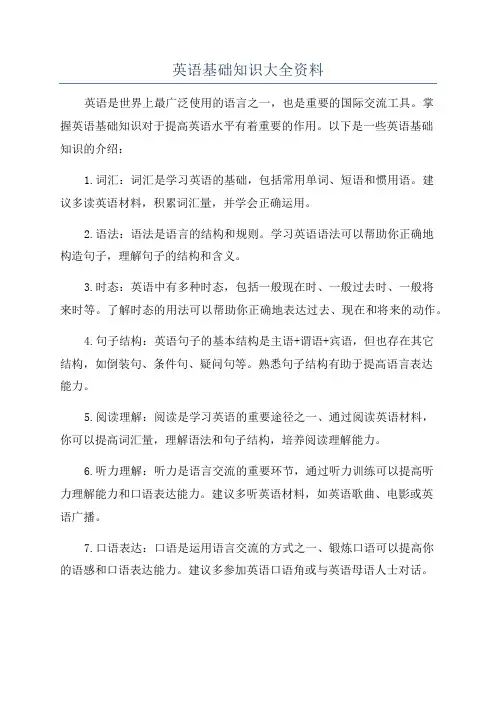
英语基础知识大全资料英语是世界上最广泛使用的语言之一,也是重要的国际交流工具。
掌握英语基础知识对于提高英语水平有着重要的作用。
以下是一些英语基础知识的介绍:1.词汇:词汇是学习英语的基础,包括常用单词、短语和惯用语。
建议多读英语材料,积累词汇量,并学会正确运用。
2.语法:语法是语言的结构和规则。
学习英语语法可以帮助你正确地构造句子,理解句子的结构和含义。
3.时态:英语中有多种时态,包括一般现在时、一般过去时、一般将来时等。
了解时态的用法可以帮助你正确地表达过去、现在和将来的动作。
4.句子结构:英语句子的基本结构是主语+谓语+宾语,但也存在其它结构,如倒装句、条件句、疑问句等。
熟悉句子结构有助于提高语言表达能力。
5.阅读理解:阅读是学习英语的重要途径之一、通过阅读英语材料,你可以提高词汇量,理解语法和句子结构,培养阅读理解能力。
6.听力理解:听力是语言交流的重要环节,通过听力训练可以提高听力理解能力和口语表达能力。
建议多听英语材料,如英语歌曲、电影或英语广播。
7.口语表达:口语是运用语言交流的方式之一、锻炼口语可以提高你的语感和口语表达能力。
建议多参加英语口语角或与英语母语人士对话。
8.写作技巧:写作是一项重要的英语技能。
通过写作,你可以锻炼词汇和语法能力,并表达自己的观点和思想。
建议多写英语作文,尝试各种类型的写作。
9.语言技巧:掌握一些语言技巧可以帮助你更好地运用英语。
如词义辨析、同义词替换、时态转换等。
学会灵活运用这些技巧可以提高语言表达的能力。
10.常用表达:掌握一些常用表达可以帮助你更好地与别人交流。
如问候语、道歉语、感谢语等。
学会用地道的表达方式可以帮助你更好地融入英语环境。
以上是一些英语基础知识的介绍,希望对你的英语学习有所帮助。
记住,坚持学习和实践是提高英语水平的关键!。
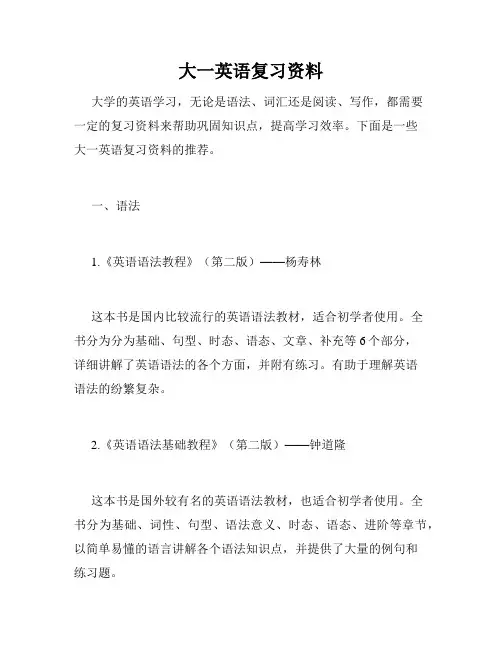
大一英语复习资料大学的英语学习,无论是语法、词汇还是阅读、写作,都需要一定的复习资料来帮助巩固知识点,提高学习效率。
下面是一些大一英语复习资料的推荐。
一、语法1.《英语语法教程》(第二版)——杨寿林这本书是国内比较流行的英语语法教材,适合初学者使用。
全书分为分为基础、句型、时态、语态、文章、补充等6个部分,详细讲解了英语语法的各个方面,并附有练习。
有助于理解英语语法的纷繁复杂。
2.《英语语法基础教程》(第二版)——钟道隆这本书是国外较有名的英语语法教材,也适合初学者使用。
全书分为基础、词性、句型、语法意义、时态、语态、进阶等章节,以简单易懂的语言讲解各个语法知识点,并提供了大量的例句和练习题。
二、词汇1.《实用英语词汇》(词根+词缀)——李琦这本书主要介绍词根和词缀的具体含义和组合方式,让读者通过学习词根和词缀加深词汇记忆,扩展词汇量。
此外,书中也附有相关的练习题,方便巩固记忆。
2.《牛津3000词表》这份词表是牛津大学根据英语语料库中的数据整理出来的一个常用词表,包含3000个左右的词汇,这些词汇在日常英文交流中经常出现。
可以帮助大家更好地掌握英语的基础词汇。
三、阅读1.《大学英语读物》系列这套书包括三个级别(初级、中级、高级),每个级别都有课文和课后练习。
初级阶段主要讲述一些简短的故事、文章,适合在英语阅读技巧方面进行练习。
中级阶段的语言难度和篇幅都有所加强,适合培养阅读长篇文章的技巧。
高级阶段的阅读材料则更加丰富,难度相对较高,适合提升英语阅读和理解能力。
2.英语新闻网站BBC、CNN、Reuters等国际新闻媒体的英文网站可以帮助大家深入了解国际新闻,并锻炼英语阅读能力。
同时,国内的《中国日报》、《中国经济网》等网站也可以加以使用,关注国内外的大事小情。
四、写作1.《大学英语写作》——EmmaMackenzie这本书为大学生提供了很多实用的写作技巧,包括写作步骤、写作格式、句型搭配、段落组织,以及一些常用的写作技巧,如排比、比喻、比较等等。
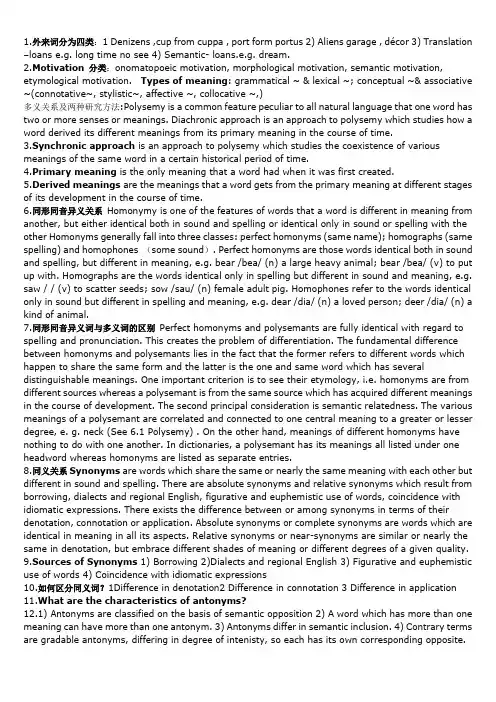
1.外来词分为四类:1 Denizens ,cup from cuppa , port form portus 2) Aliens garage , décor 3) Translation –loans e.g. long time no see 4) Semantic- loans.e.g. dream.2.Motivation 分类:onomatopoeic motivation, morphological motivation, semantic motivation, etymological motivation. Types of meaning: grammatical ~ & lexical ~; conceptual ~& associative ~(connotative~, stylistic~, affective ~, collocative ~,)多义关系及两种研究方法:Polysemy is a common feature peculiar to all natural language that one word has two or more senses or meanings. Diachronic approach is an approach to polysemy which studies how a word derived its different meanings from its primary meaning in the course of time.3.Synchronic approach is an approach to polysemy which studies the coexistence of various meanings of the same word in a certain historical period of time.4.Primary meaning is the only meaning that a word had when it was first created.5.Derived meanings are the meanings that a word gets from the primary meaning at different stages of its development in the course of time.6.同形同音异义关系Homonymy is one of the features of words that a word is different in meaning from another, but either identical both in sound and spelling or identical only in sound or spelling with the other Homonyms generally fall into three classes: perfect homonyms (same name); homographs (same spelling) and homophones (some sound). Perfect homonyms are those words identical both in sound and spelling, but different in meaning, e.g. bear /bea/ (n) a large heavy animal; bear /bea/ (v) to put up with. Homographs are the words identical only in spelling but different in sound and meaning, e.g. saw / / (v) to scatter seeds; sow /sau/ (n) female adult pig. Homophones refer to the words identical only in sound but different in spelling and meaning, e.g. dear /dia/ (n) a loved person; deer /dia/ (n) a kind of animal.7.同形同音异义词与多义词的区别Perfect homonyms and polysemants are fully identical with regard to spelling and pronunciation. This creates the problem of differentiation. The fundamental difference between homonyms and polysemants lies in the fact that the former refers to different words which happen to share the same form and the latter is the one and same word which has several distinguishable meanings. One important criterion is to see their etymology, i.e. homonyms are from different sources whereas a polysemant is from the same source which has acquired different meanings in the course of development. The second principal consideration is semantic relatedness. The various meanings of a polysemant are correlated and connected to one central meaning to a greater or lesser degree, e. g. neck (See 6.1 Polysemy) . On the other hand, meanings of different homonyms have nothing to do with one another. In dictionaries, a polysemant has its meanings all listed under one headword whereas homonyms are listed as separate entries.8.同义关系Synonyms are words which share the same or nearly the same meaning with each other but different in sound and spelling. There are absolute synonyms and relative synonyms which result from borrowing, dialects and regional English, figurative and euphemistic use of words, coincidence with idiomatic expressions. There exists the difference between or among synonyms in terms of their denotation, connotation or application. Absolute synonyms or complete synonyms are words which are identical in meaning in all its aspects. Relative synonyms or near-synonyms are similar or nearly the same in denotation, but embrace different shades of meaning or different degrees of a given quality.9.Sources of Synonyms 1) Borrowing 2)Dialects and regional English 3) Figurative and euphemistic use of words 4) Coincidence with idiomatic expressions10.如何区分同义词?1Difference in denotation2 Difference in connotation 3 Difference in application11.What are the characteristics of antonyms?12.1) Antonyms are classified on the basis of semantic opposition 2) A word which has more than one meaning can have more than one antonym. 3) Antonyms differ in semantic inclusion. 4) Contrary terms are gradable antonyms, differing in degree of intenisty, so each has its own corresponding opposite.13.上下义关系:Hyponymy deals with the relationship of semantic inclusion. That is, the meaning of a more specific word is included in that of another more general word. Superordinates refer to some general words; subordinates denote those more specific words. Hyponymy can be described in terms of tree-like graphs, with higher-order superordinates above the lower subordinates. But their status either as superordinate or subordinate is relative to other terms. For example, horse, dog, pig are subordinates in relation to animal, but superordinates of mare, hound and boar, Animal itself becomesa subordinate of creature. And creature in turn becomes14.词义变化的种类There are five types of meaning, changes: extension, narrowing, degradation, elevation, and transfer among which extension and narrowing are the most common. Changes in meaning can be accounted for from extra-linguistic factors (historical reason, class reason, and psychological reason) and intra-linguistic factors (shortening, the influx of borrowing, and analogy).15.词义的扩大Extension is a process by which a word with a specialized sense is generalized to cover a broader or less16.definite concept. Compare the following;词义的缩小Narrowing is a process by which a word of wider meaning acquires a specialized sense;词义的升华Elevation is a process by which a word moves from a derogatory or neutral sense to a neutral and/or appreciative sense;词义的降格Degradation is a process by which a word of reputation slides into a pejorative use,;词义的转移Transfer is a process by which a word denoting one thing changes to refer to a different but related thing. Paper serves as an example. This word formerly denoted an African plant papyrus, which was once used to make paper. In modern times, paper is made from rags, wood, straw and the like, but the product has retained the same name. There is associated transfer. There are other kinds of transfer, such as, concrete to abstract, abstract to concrete and transfer of sensation.17.语境的种类:非语言语境。
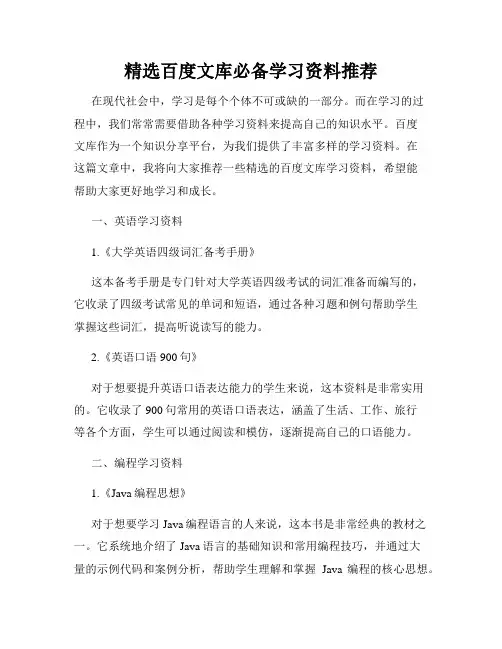
精选百度文库必备学习资料推荐在现代社会中,学习是每个个体不可或缺的一部分。
而在学习的过程中,我们常常需要借助各种学习资料来提高自己的知识水平。
百度文库作为一个知识分享平台,为我们提供了丰富多样的学习资料。
在这篇文章中,我将向大家推荐一些精选的百度文库学习资料,希望能帮助大家更好地学习和成长。
一、英语学习资料1.《大学英语四级词汇备考手册》这本备考手册是专门针对大学英语四级考试的词汇准备而编写的,它收录了四级考试常见的单词和短语,通过各种习题和例句帮助学生掌握这些词汇,提高听说读写的能力。
2.《英语口语900句》对于想要提升英语口语表达能力的学生来说,这本资料是非常实用的。
它收录了900句常用的英语口语表达,涵盖了生活、工作、旅行等各个方面,学生可以通过阅读和模仿,逐渐提高自己的口语能力。
二、编程学习资料1.《Java编程思想》对于想要学习Java编程语言的人来说,这本书是非常经典的教材之一。
它系统地介绍了Java语言的基础知识和常用编程技巧,并通过大量的示例代码和案例分析,帮助学生理解和掌握Java编程的核心思想。
2.《Python编程从入门到实践》Python作为一门简洁、易学的编程语言,备受程序员的喜爱。
这本书适合初学者入门,它以实践为导向,通过编写代码的方式帮助学生学习Python的语法和常用功能,以及如何应用Python解决实际问题。
三、艺术学习资料1.《色彩基础教程》色彩是绘画和设计中非常重要的一部分,这本教程详细介绍了色彩的基本原理、色彩搭配的技巧和常见的色彩应用,通过各种实例和练习帮助学生掌握色彩的运用和表达。
2.《音乐欣赏与鉴赏》对于喜爱音乐的人来说,这本资料可以帮助他们更好地欣赏和理解音乐作品。
它介绍了音乐的基本知识、音乐风格的特点以及如何进行音乐鉴赏,通过大量的音乐例子和分析,帮助学生提升自己的音乐素养。
四、心理学学习资料1.《心理学概论》心理学作为一门研究人类思维和行为的科学,对于个人的成长和发展有着重要的影响。
英语入门基础学习(免费版)一、认识英语字母表英语共有26个字母,分为元音字母和辅音字母。
元音字母有5个:Aa、Ee、Ii、Oo、Uu。
辅音字母有21个:Bb、Cc、Dd、Ff、Gg、Hh、Jj、Kk、Ll、Mm、Nn、Pp、Qq、Rr、Ss、Tt、Vv、Ww、Xx、Yy、Zz。
掌握这些字母是学习英语的基础。
二、学习国际音标1. 元音音标:/i:/、/ɪ/、/e/、/æ/、/ɑ:/、/ɔ:/、/ɒ/、/u:/、/ʊ/、/ʌ/、/ə/、/eɪ/、/aɪ/、/ɔɪ/、/ɪə/、/eə/、/ʊə/2. 辅音音标:/p/、/b/、/t/、/d/、/k/、/g/、/f/、/v/、/s/、/z/、/θ/、/ð/、/ʃ/、/ʒ/、/tʃ/、/dʒ/、/tr/、/dr/、/ts/、/dz/、/m/、/n/、/ŋ/、/h/、/l/、/r/三、学习基本词汇1. 代词:I、you、he、she、it、we、they2. 名词:boy、girl、man、woman、dog、cat、sun、moon4. 形容词:big、small、tall、short、happy、sad、good、bad5. 副词:now、then、here、there、soon、often四、学习简单句型1. 陈述句:主语+谓语+宾语。
如:I like English.2. 疑问句:Do/Does+主语+谓语+宾语?如:Does she like apples?3. 否定句:主语+don't/doesn't+谓语+宾语。
如:He doesn'tgo to school bus.4. 祈使句:动词原形+宾语。
如:Please open the door.五、掌握基本语法规则1. 时态:英语有三种基本时态——过去、现在和将来。
初学者应掌握一般现在时、一般过去时和一般将来时。
例如:一般现在时:He eats an apple every day.一般过去时:She visited the museum yesterday.一般将来时:They will go to the park next week.2. 语态:英语有两种语态——主动语态和被动语态。
英语学习资料总结(初级)英语学习资料1. 26个英⽂字母Aa、Bb、Cc、Dd、Ee、Ff、Gg、Hh、Ii、Jj、Kk、Ll、Mm、Nn、Oo、Pp、Qq、Rr、Ss、Tt、Uu、Vv、Ww、Xx、Yy、Zz;2. 星期(week)Monday星期⼀Tuesday星期⼆Wednesday星期三Thursday星期四Friday星期五Saturday星期六Sunday星期天weekend周末3. ⽉份(months)Jan. (January)⼀⽉Feb.(February)⼆⽉Mar.(March)三⽉April四⽉May五⽉June六⽉July七⽉Aug.(August)⼋⽉Sept. (September)九⽉Oct.(October)⼗⽉Nov.(November)⼗⼀⽉Dec.(December)⼗⼆⽉4. 季节(seasons)spring春summer夏fall/autumn秋winter冬5. ⽅位(directions)south南north北east东west西left 左边right右边6. ⼈体(body)foot脚head头face脸hair头发nose⿐⼦mouth嘴eye眼睛ear⽿朵arm⼿臂hand⼿finger⼿指leg腿tail尾巴7. 颜⾊(colours)red红blue蓝yellow黄green绿white⽩black⿊pink粉红purple紫orange 橙brown棕8.⼈物(people)friend朋友boy男孩girl⼥孩mother母亲father⽗亲sister姐妹brother兄弟uncle叔叔;舅舅man男⼈woman⼥⼈Mr.先⽣Miss⼩姐lady⼥⼠;⼩姐mom 妈妈dad爸爸parents⽗母grandparents祖⽗母grandma/grandmother(外)祖母grandpa/grandfather(外)祖⽗aunt姑姑cousin堂(表)兄弟;堂(表)姐妹son⼉⼦daughter⼥⼉baby婴⼉kid⼩孩classmate同学queen⼥王visitor 参观者neighbour邻居principal校长university student⼤学⽣pen pal笔友tourist旅⾏者people ⼈物robot机器⼈9. 职业(jobs)teacher教师student学⽣doctor医⽣nurse护⼠driver司机farmer农民singer 歌唱家writer作家actor男演员actress⼥演员artist画家TV reporter电视台记者engineer⼯程师accountant会计policeman(男)警察salesperson销售员cleaner清洁⼯baseball player棒球运动员assistant售货员police警察10. 学习⽤品(school things)pen钢笔pencil铅笔pencil-case铅笔盒ruler尺⼦book书bag包comic book 漫画书post card明信⽚newspaper报纸schoolbag书包eraser橡⽪crayon蜡笔sharpener卷笔⼑story-book故事书notebook笔记本Chinese book语⽂书English book英语书math book数学书magazine杂志dictionary词典11. 课程(classes)sports体育运动science科学Moral Education思想品德课Social Studies社会课Chinese语⽂math数学PE体育课English英语课12. 国家、城市(countries & cities)China/PRC中国America/USA美国UK联合王国England英国Canada/CAN加拿⼤Australia澳⼤利亚New York纽约London伦敦Sydney悉尼Moscow莫斯科Cairo开罗13. ⾷品、饮料(food & drink)rice⽶饭bread⾯包beef⽜⾁milk⽜奶water⽔egg蛋fish鱼tofu⾖腐cake 蛋糕hot dog热狗hamburger汉堡包French fries炸薯条cookie曲奇biscuit饼⼲jam果酱noodles⾯条meat⾁chicken鸡⾁pork猪⾁mutton⽺⾁vegetable 蔬菜salad沙拉soup汤ice冰ice-cream冰淇淋Coke可乐juice果汁tea茶coffee咖啡breakfast早餐lunch午餐dinner/supper晚餐meal⼀餐14. ⽔果、蔬菜(fruit & vegetables)apple苹果banana⾹蕉pear梨orange橙watermelon西⽠grape葡萄eggplant 茄⼦green beans青⾖tomato西红柿potato⼟⾖peach桃strawberry草莓cucumber黄⽠onion洋葱carrot胡萝⼘cabbage卷⼼菜15. ⾐服(clothes)jacket夹克衫shirt衬衫T-shirt丅恤衫skirt短裙⼦dress连⾐裙jeans⽜仔裤pants长裤socks袜⼦shoes鞋⼦sweater⽑⾐coat上⾐raincoat⾬⾐shorts短裤sneakers⽹球鞋slippers拖鞋sandals凉鞋boots靴⼦hat(有沿的)帽⼦cap 便帽sunglasses太阳镜tie领带scarf围⼱gloves⼿套trousers裤⼦cloth布16. 交通⼯具(vehicles)bike⾃⾏车bus公共汽车train⽕车boat⼩船ship轮船yacht快艇car⼩汽车taxi出租车jeep吉普车van⼩货车;⾯包车plane/airplane飞机subway/underground地铁motor cycle摩托车17. 杂物(other things)window窗户door门desk课桌chair椅⼦bed床computer计算机board写字板fan风扇light灯teacher's desk讲台picture图画;照⽚wall墙壁floor地板curtain窗帘trash bin垃圾箱closet壁橱mirror镜⼦end table床头柜football/soccer⾜球present礼物walkman随⾝听lamp台灯phone电话sofa沙发shelf书架fridge冰箱table桌⼦TV电视air-conditioner空调key钥匙lock 锁photo照⽚chart图表plate盘⼦knife⼑fork叉spoon勺⼦chopsticks筷⼦pot锅gift礼物toy玩具doll 洋娃娃ball球balloon⽓球kite风筝jigsaw puzzle 拼图游戏box盒⼦umbrella伞zipper拉链violin⼩提琴yo-yo溜溜球nest鸟窝hole 洞tube管⼦toothbrush⽛刷menu菜单e-card电⼦卡⽚e-mail电⼦邮件traffic light交通灯money钱medicine药18. 地点(locations)home家room房间bedroom卧室bathroom卫⽣间living room起居室kitchen 厨房classroom教室school学校park公园library图书馆post office邮局police office警察局hospital医院cinema电影院bookstore书店farm农场zoo动物园garden花园study书房playground操场canteen⾷堂teacher's office教师办公室library图书馆gym体育馆washroom卫⽣间art room绘画教室computer room 计算机教室music room⾳乐教室TV room电视机房flat公寓company公司factory⼯⼚fruit stand⽔果摊pet shop宠物商店nature park⾃然公园theme park主题公园science museum科学博物馆the Great Wall长城supermarket超市bank银⾏country国家village乡村city城市hometown家乡bus stop公交车站19. ⽓象(weather)cold寒冷的warm温暖的cool凉爽的snowy下雪的sunny晴朗的hot炎热的rainy下⾬的windy有风的cloudy多云的weather report 天⽓预报20. 景物(nature)river河流lake湖泊stream河;溪forest森林path⼩道road公路house房⼦bridge桥building建筑物rain⾬cloud云sun太阳mountain⼭sky天空rainbow彩虹wind风air空⽓moon⽉亮21. 动物(animals)cat猫dog狗pig猪duck鸭rabbit兔horse马elephant⼤象ant蚂蚁fish鱼bird鸟eagle鹰beaver海狸snake蛇mouse⽼⿏squirrel松⿏kangaroo袋⿏monkey猴panda熊猫bear熊lion狮⼦tiger⽼虎fox狐狸zebra斑马deer⿅giraffe长颈⿅goose鹅hen母鸡turkey⽕鸡lamb⼩⽺sheep绵⽺goat⼭⽺cow奶⽜donkey驴squid鱿鱼lobster龙虾shark鲨鱼seal海豹sperm whale 抹⾹鲸killer whale虎鲸22. 植物(plants)flower花grass草tree树seed种⼦sprout苗plant植物rose玫瑰leaf叶⼦23. 患病(illness)have a fever发烧hurt疼痛have a cold感冒have a toothache⽛疼have a headache头疼have a sore throat喉咙疼24. 数词(numbers)one⼀two⼆three三four四five五six六seven七eight⼋nine九ten⼗eleven⼗⼀twelve⼗⼆thirteen⼗三fourteen⼗四fifteen⼗五sixteen⼗六seventeen⼗七eighteen⼗⼋nineteen⼗九twenty⼆⼗thirty三⼗forty四⼗fifty五⼗sixty六⼗seventy七⼗eighty⼋⼗ninety九⼗hundred百one/a hundred and thirty-nine⼀百三⼗九first第⼀second第⼆third第三fourth第四fifth第五eighth第⼋ninth第九twelfth第⼗⼆twentieth第⼆⼗thirtieth第三⼗fortieth第四⼗fiftieth第五⼗sixtieth第六⼗seventieth第七⼗eightieth第⼋⼗ninetieth第九⼗fifty-sixth第五⼗六25. 形容词(adj.)big⼤的small⼩的long长的tall⾼的short短的;矮的young年轻的old旧的;⽼的strong健壮的thin瘦的active积极活跃的quiet安静的nice好看的kind 和蔼亲切的strict严格的smart聪明的funny滑稽可笑的tasty好吃的sweet甜的salty咸的sour酸的fresh新鲜的favourite最喜爱的clean⼲净的tired疲劳的excited兴奋的angry⽣⽓的happy⾼兴的bored⽆聊的sad忧愁的taller更⾼的shorter 更矮的stronger更强壮的older年龄更⼤的younger更年轻的bigger更⼤的heavier更重的longer更长的thinner更瘦的smaller更⼩的good 好的fine好的great很好的heavy 重的new新的fat胖的happy快乐的right 对的hungry饥饿的cute逗⼈喜爱的little⼩的lovely可爱的beautiful漂亮的colourful⾊彩鲜艳的pretty漂亮的cheap便宜的expensive昂贵的juicy多汁的tender嫩的healthy健康的ill有病的helpful有帮助的high⾼的easy简单的proud骄傲的sick有病的better更好的higher更⾼的26. 介词(prep.)in在……⾥on在……上;在……时候under在……下⾯near在……的旁边behind在……后边next to与……相邻over在……上⾯in front of在……前⾯27. 代词(pron.)I我we我们you你;你们he他she她it它they他(她,它)们my我的our 我们的your你的;你们的his他的her她的28. 动词(v.)play(.ed)玩;踢swim(swam)游泳skate滑冰fly(flew)飞jump跳walk⾛run(run)跑climb爬fight(fought)打架swing(swung)荡eat(ate)吃sleep(slept)睡觉like 像,喜欢have(had)有;吃turn转弯buy(bought)买take(took)买;带live居住teach(taught)教go(went)去study(studied)学习learn学习sing(sang)唱歌dance 跳舞row划do(did)做do homework做作业do housework做家务watch TV看电视read(read) books读书cook the meals做饭water the flowers浇花sweep(swept) the floor扫地clean the bedroom打扫卧室make(made) the bed铺床set(set) the table摆饭桌wash the clothes洗⾐服do the dishes洗碗碟use a computer使⽤计算机do morning exercises晨练;做⼴播操eat breakfast吃早饭eat dinner吃晚饭go to school上学have English class上英语课play sports进⾏体育运动get(got)up起床climb mountains爬⼭go shopping买东西play the piano 弹钢琴visit grandparents看望(外)祖⽗母go hiking去远⾜fly kites放风筝make a snowman堆雪⼈plant trees种树draw(drew) pictures画画cook dinner做饭read a book看书answer the phone接电话listen to music听⾳乐clean the room打扫房间write(wrote) a letter写信write an e-mail写电⼦邮件drink(drank) water喝⽔take pictures照相watch insects观察昆⾍pick up leaves采摘树叶do an experiment做实验catch butterflies捉蝴蝶count insects数昆⾍collect insects 收集昆⾍collect leaves收集树叶write a report写报告play chess下棋have a picnic举⾏野餐get to到达ride(rode) a bike骑⾃⾏车play the violin拉⼩提琴make kites制作风筝collect stamps集邮meet(met)见⾯welcome欢迎thank谢谢love爱work⼯作drink(drank)喝taste尝smell闻feed(fed)喂养shear剪milk 挤奶look看guess猜help帮助pass传递show展⽰use 使⽤clean打扫open 打开close关上put放paint绘画tell(told)告诉kick踢bounce反弹ride(rode)骑stop(stopped)停wait等find(found)寻找到drive(drove)驾驶fold折send(sent)寄wash洗shine照耀become变成feel(felt)感觉到think(thought)思考meet(met)遇见fall(fell)落下leave(left)离开wake(woke) up醒来put on穿上take off脱掉hang up挂起wear(wore)穿go home回家go to bed上床睡觉play computer games玩电脑游戏play chess下棋empty the trash倒垃圾put away the clothes收拾⾐服get off 下车take a trip去旅⾏read a magazine阅读杂志go to the cinema 去看电影go straight向前直⾛。
MarrakechGeorge Orwell1 As the corpse went past the flies left the restaurant table in a cloud and rushed after it, but they came back a few minutes later.2 The little crowd of mourners -- all men and boys, no women--threaded their way across the market place between the piles of pomegranates and the taxis and the camels, walling a short chant over and over again. What really appeals to the flies is that the corpses here are never put into coffins, they are merely wrapped in a piece of rag and carried on a rough wooden bier on the shoulders of four friends. When the friends get to the burying-ground they hack an oblong hole a foot or two deep, dump the body in it and fling over it a little of the dried-up, lumpy earth, which is like broken brick. No gravestone, no name, no identifying mark of any kind. The burying-ground is merely a huge waste of hummocky earth, like a derelict building-lot. After a month or two no one can even be certain where his own relatives are buried.3 When you walk through a town like this -- two hundred thousand inhabitants of whom at least twenty thousand own literally nothing except the rags they stand up in-- when you see how the people live, and still more how easily they die, it is always difficult to believe that you are walking among human beings. All colonial empires are in reality founded upon this fact. The people have brown faces--besides, there are so many of them! Are they really the same flesh as yourself? Do they even have names? Or are they merely a kind of undifferentiated brown stuff, about as individual as bees or coral insects? They rise out of the earth,they sweat and starve for a few years, and then they sink back into the nameless mounds of the graveyard and nobody notices that they are gone. And even the graves themselves soon fade back into the soil. Sometimes, out for a walk as you break your way through the prickly pear, you notice that it is rather bumpy underfoot, and onlya certain regularity in the bumps tells you that you are walking over skeletons.4 I was feeding one of the gazelles in the public gardens.5 Gazelles are almost the only animals that look good to eat when they are still alive, in fact, one can hardly look at their hindquarters without thinking of a mint sauce. The gazelle I was feeding seemed to know that this thought was in my mind, for though it took the piece of bread I was holding out it obviously did not like me. It nibbled rapidly at the bread, then lowered its head and tried to butt me, then took another nibble and then butted again. Probably its idea was that if it could drive me away the bread would somehow remain hanging in mid-air.6 An Arab navvy working on the path nearby lowered his heavy hoe and sidled slowly towards us. He looked from the gazelle to the bread and from the bread to the gazelle, with a sort of quiet amazement, as though he had never seen anything quite like this before. Finally he said shyly in French: “I could eat some of that bread.”7 I tore off a piece and he stowed it gratefully in some secret place under his rags. This man is an employee of the municipality.8 When you go through the Jewish Quarters you gather some idea of what the medieval ghettoes were probably like. Under their Moorish rulers the Jews were only allowed to own land in certain restricted areas, and after centuries of this kind of treatment they have ceased to bother aboutovercrowding. Many of the streets are a good deal less than six feet wide, the houses are completely windowless, and sore-eyed children cluster everywhere in unbelievable numbers, like clouds of flies. Down the centre of the street there is generally running a little river of urine.9 In the bazaar huge families of Jews, all dressed in the long black robe and little black skull-cap, are working in dark fly-infested booths that look like caves. A carpenter sits crosslegged at a prehistoric lathe, turning chairlegs at lightning speed. He works the lathe with a bow in his right hand and guides the chisel with his left foot, and thanks to a lifetime of sitting in this position his left leg is warped out of shape. At his side his grandson, aged six, is already starting on the simpler parts of the job.10 I was just passing the coppersmiths’ booths when somebody noticed that I was lighting a cigarette. Instantly, from the dark holes all round, there was a frenzied rush of Jews, many of them old grandfathers with flowing grey beards, all clamouring for a cigarette. Even a blind man somewhere at the back of one of the booths heard a rumour of cigarettes and came crawling out, groping in the air with his hand. In about a minute I had used up the whole packet. None of these people, I suppose, works less than twelve hours a day, and every one of them looks on a cigarette asa more or less impossible luxury.11 As the Jews live in self-contained communities they follow the same trades as the Arabs, except for agriculture. Fruitsellers, potters, silversmiths, blacksmiths, butchers, leather-workers, tailors, water-carriers, beggars, porters -- whichever way you look you see nothing but Jews. As a matter of fact there are thirteen thousand of them, all living in the space of a few acres. A good job Hitler wasn’t here. Perhaps he was on his way, however. You hear the usual dark rumours about Jews, not only from the Arabs but from the poorer Europeans.12 “Yes vieux mon vieux, they took my job away from me and gave it to a Jew. The Jews! They’re the real rulers of this country, you know. They’ve got all the money. They control the banks, finance -- everything.”13 “But”, I said, “isn’t it a fact that the average Jew is a labourer working for about a penny an hour?”14 “Ah, that’s only for show! They’re all money lenders really. They’re cunning, the Jews.”15 In just the same way, a couple of hundred years ago, poor old women used to be burned for witchcraft when they could not even work enough magic to get themselves a square meal.16 All people who work with their hands are partly invisible, and the more important the work they do, the less visible they are. Still, a white skin is always fairly conspicuous. In northern Europe, when you see a labourer ploughing a field, you probably give him a second glance. In a hot country, anywhere south of Gibraltar or east of Suez, the chances are that you don’t even see him. I have noticed this again and again. In a tropical landscape one’s eye takes in everything except the human beings. It takes in the dried-up soil, the prickly pear, the palm tree and the distant mountain, but it always misses the peasant hoeing at his patch. He is the same colour as the earth, and a great deal less interesting to look at.17 It is only because of this that the starved countries of Asia and Africa are accepted as tourist resorts. No one would think of running cheap trips to the Distressed Areas. But where the human beings have brown skins their poverty is simply not noticed. What does Morocco mean to a Frenchman? An orange grove or a job in Government service. Or to an Englishman? Camels,castles, palm trees, Foreign Legionnaires, brass trays, and bandits. One could probably live there for years without noticing that for nine-tenths of the people the reality of life is an endless back-breaking struggle to wring a little food out of an eroded soil.18 Most of Morocco is so desolate that no wild animal bigger than a hare can live on it. Huge areas which were once covered with forest have turned into a treeless waste where the soil is exactly like broken-up brick. Nevertheless a good deal of it is cultivated, with frightful labour. Everything is done by hand. Long lines of women, bent double like inverted capital Ls, work their way slowly across the fields, tearing up the prickly weeds with their hands, and the peasant gathering lucerne for fodder pulls it up stalk by stalk instead of reaping it, thus saving an inch or two on each stalk. The plough is a wretched wooden thing, so frail that one can easily carry it on one’s shoulder, and fitted underneath with a rough iron spike which stirs the soil to a depth of about four inches. This is as much as the strength of the animals is equal to. It is usual to plough with a cow and a donkey yoked together. Two donkeys would not be quite strong enough, but on the other hand two cows would cost a little more to feed. The peasants possess no narrows, they merely plough the soil several times over in different directions, finally leaving it in rough furrows, after which the whole field has to be shaped with hoes into small oblong patches to conserve water. Except for a day or two after the rare rainstorms there is never enough water. Along the edges of the fields channels are hacked out to a depth of thirty or forty feet to get at the tiny trickles which run through the subsoil.19 Every afternoon a file of very old women passes down the road outside my house, each carrying a load of firewood. All of them are mummified with age and the sun, and all of them are tiny. It seems to be generally the case in primitive communities that the women, when they get beyond a certain age, shrink to the size of children. One day poor creature who could not have been more than four feet tall crept past me under a vast load of wood. I stopped her and put a five-sou piece into her hand. She answered with a shrill wail, almost a scream, which was partly gratitude but mainly surprise. I suppose that from her point of view, by taking any notice of her, I seemed almost to be violating a law of nature. She accept- ed her status as an old woman, that is to say as a beast of burden. When a family is travelling it is quite usual to see a father and a grown-up son riding ahead on donkeys, and an old woman following on foot, carrying the baggage.20 But what is strange about these people is their invisibility. For several weeks, always at about the same time of day, the file of old women had hobbled past the house with their firewood, and though they had registered themselves on my eyeballs I cannot truly say that I had seen them. Firewood was passing -- that was how I saw it. It was only that one day I happened to be walking behind them, and the curious up-and-down motion of a load of wood drew my attention to the human being beneath it. Then for the first time I noticed the poor old earth-coloured bodies, bodies reduced to bones and leathery skin, bent double under the crushing weight. Yet I suppose I had not been five minutes on Moroccan soil before I noticed the overloading of the donkeys and was infuriated by it. There is no question that the donkeys are damnably treated. The Moroccan donkey is hardly bigger than a St. Bernard dog, it carries a load which in the British Army would be considered too much for a fifteen-hands mule, and very often its packsaddle is not taken off its back for weeks together. But what is peculiarly pitiful is that it is the most willing creature on earth, it follows its master like a dog and does not need either bridle or halter. After a dozen years of devoted work it suddenly drops dead, whereupon its master tips it into the ditch and the village dogs have torn its guts out before it is cold.21 This kind of thing makes one’s blood boil, whereas -- on the whole -- the plight of the human beings does not. I am not commenting, merely pointing to a fact. People with brown skins are next door to invisible. Anyone can be sorry for the donkey with its galled back, but it is generally owing to some kind of accident if one even notices the old woman under her load of sticks.22 As the storks flew northward the Negroes were marching southward -- a long, dusty column, infantry, screw-gun batteries, and then more infantry, four or five thousand men in all, winding up the road with a clumping of boots and a clatter of iron wheels.23 They were Senegalese, the blackest Negroes in Africa, so black that sometimes it is difficult to see whereabouts on their necks the hair begins. Their splendid bodies were hidden in reach-me-down khaki uniforms, their feet squashed into boots that looked like blocks of wood, and every tin hat seemed to be a couple of sizes too small. It was very hot and the men had marched a long way. They slumped under the weight of their packs and the curiously sensitive black faces were glistening with sweat.24 As they went past, a tall, very young Negro turned and caught my eye. But the look he gave me was not in the least the kind of look you might expect. Not hostile, not contemptuous, not sullen, not even inquisitive. It was the shy, wide-eyed Negro look, which actually is a look of profound respect. I saw how it was. This wretched boy, who is a French citizen and has therefore been dragged from the forest to scrub floors and catch syphilis in garrison towns, actually has feelings of reverence before a white skin. He has been taught that the white race are his masters, and he still believes it.25 But there is one thought which every white man (and in this connection it doesn’t matter twopence if he calls himself a socialist) thinks when he sees a black army marching past. “How much longer can we go on kidding these people? How long before they turn their guns in the other direction?”26 It was curious really. Every white man there had this thought stowed somewhere or other in his mind. I had it, so had the other onlookers, so had the officers on their sweating chargers and the white N. C. Os marching in the ranks. It was a kind of secret which we all knew and were too clever to tell; only the Negroes didn’t know it. And really it was like watching a flock of cattle to see the long column, a mile or two miles of armed men, flowing peacefully up the road, while the great white birds drifted over them in the opposite direction, glittering like scraps of Paper.(from Reading for Rhetoric, by Caroline Shrodes, Clifford A. Josephson and James R. Wilson)。
ACTION ENGLISH 1MOVIE DICTIONARY 电影词典sound engineer, a person who make sound better 录音师AMERICAN SLANG 美国俚语Rumo(u)r has it that…据说……;人们都说……例句:Rumor has it that Andy is a nice guy. 人们都说安迪是个棒小伙。
Rumor has it that he is a rather difficult sound engineer. 人们都说那个录音师很难相处.Rumour has it that Jean’s getting married again. 人们都说吉恩又要结婚了。
Rumors have it that there will be a change in the Cabinet. 谣传内阁将改组。
Rumour has it that he is going to resign. 据说他将辞职。
CLASSIC FILM CLIPS 经典对白The BeachMy name is Richard.So what else do you need to know?Stuff about my family or where I’m from.None of that matters.Not once you cross the ocean and cut yourself loose. Looking for something more beautiful something more exciting and yet, I admit something more dangerous.After 18 hours in the back of an airplane three dumb movies, two plastic meals, six beers and absolutely no sleep, I finally touched down in Bangkok.‘Hey, how about you? You want to go to the waterfall? Cheap for you, come on.’‘Hey, you need somewhere to stay?’‘I’ll be fine. I’ll find my own place, thanks.’‘What do you want, man?’And this is it. Bangkok, good time city, gateway to southeast Asia.Where dollar and Deutschmarks.Get turned into counterfeit watches and genuine scars.‘It’s a good time, boys? Girls? This is where the hungry come to feed. You wanna drink snake blood?‘Wait a minute. Did you say snake blood?’‘Oh yeah.’‘No, thanks.’‘What is wrong with snake blood?’‘I just don’t like the idea.’‘Or maybe you scared? Afraid of something new?’‘No, I just don’t like the idea, that’s all.’‘Ha ha! Like every tourist. You are all the same just like America.’So never refuse an invitation.Never resist the unfamiliar.Never fall to be polite. ‘Gentlemen, that was excellent.’Never outstay your welcome.Just keep your mind open and suck in the experience.And if hurts it’s probably worth it.重点词句:None of that matters. 无关紧要。
英语入门学习资料英语是世界上最广泛使用的语言之一,学习英语对于提高国际交流和职业竞争力非常重要。
对于英语初学者来说,掌握一些基础的学习资料可以帮助他们建立起牢固的语言基础。
以下是一些适合英语入门学习的资料,供大家参考。
1. 词汇学习资料:- 《牛津英语词典》:这是一本全面详尽的英语词典,包含了大量的英语词汇及其释义,适合初学者用来查找和学习新单词。
- 《英语常用词汇学习手册》:这本书收录了常用的英语单词,以及它们的用法和例句,能帮助初学者建立起一定的词汇量。
2. 语法学习资料:- 《英语语法教程》:这本书可以帮助初学者理解英语语法的基本概念和规则,并提供了大量的例句和练习题,可以帮助初学者巩固所学的语法知识。
- 《剑桥英语语法》:这是一本较为全面的英语语法参考书,可以帮助初学者理解和掌握英语语法的各个方面。
3. 听力学习资料:- 《英语流行歌曲》:通过听英文歌曲能够提高听力能力,同时也有助于学习地道的英语表达方式和常用词汇。
- 《VOA慢速英语新闻》:VOA慢速英语新闻提供了以简洁明了的方式呈现的新闻报道,适合初学者用来提高听力和理解能力。
4. 阅读学习资料:- 《英语阅读教程》:这本书收录了一些简短的英语文章,适合初学者用来提高阅读能力和理解能力。
- 《英语经典小说》:选择一些适合自己水平的经典英语小说进行阅读,可以提高阅读技巧和丰富词汇量。
5. 口语学习资料:- 《英语口语学习指南》:这本书提供了一些常用的口语表达方式和例句,适合初学者用来提高口语能力。
- 与英语为母语的人交流:与英语为母语的人进行交流是提高口语能力的最好方式,可以通过一些英语角、语言交流网站等途径找到合适的交流伙伴。
这些学习资料可以帮助初学者全面提高英语水平,但最重要的还是坚持学习和练习。
通过不断地积累词汇、理解语法、提高听说读写的能力,初学者将能够逐渐感受到英语的魅力和实用性。
Teach your child to wonder Sadly, far too few/very few schools make scienceappealing/attractive/interesting/charming. Courses introduce more new vocabulary/words than foreign language courses. Textbooks are as dull/boring as dictionaries. As a result, too many children think that science is only for people as clever as Einstein.The irony is that children start out/begin as natural scientists, instinctively eager/anxious to investigate/explore the world around them. Helping them enjoy/like/love science can be easy—there’s no need/demand for a lot of scientific jargon/professional words or expensive/dear laboratory equipment/instrument/facility. You only have to share your children’s curiosity/curious. Try these simple techniques/methods:1. Listen to their questions.I once visited a class of seven-year-olds totalk about science as a career/work/job/occupation/position/professio n/vocation. The children asked me textbook questions-about schooling, salary/income/wage, whether/if I liked my job. When I finished answering, we sat facing each other in silence. Finally/at last/eventually, I said, “Now that/since we’ve finished with your lists/namelist/shopping list/menu, have you got any questions of your own about science?”After a long pause/short break, a boy raised his hand. “Have you ever seen a grasshopper eat? When I eat leaves/leaf/root/stem/trunk/bark like that, I will get stomachache/backache/headache/toothache. Why?”This began/lead to a barrage of/ a large amount of questions that lasted/continue nearly two hours. “What makes tears?”“Where do little spiders get all the stuff to make their webs?”“Am I just a bag of blood?When I cut myself, I see blood.”You may not know the answers to your child’s questions. It’s all right to say, “I don’t know but maybe we can find out.”Then you can explore the questions together.2. Tell stories, don’t recite facts.Even if/even though you know the answer to a child’s question, resist/stop the impulse to respond/react quickly, leaving no opening/time for discussion. That reinforces/strengthens the misconception that science is merely/only a set of facts stored in the heads of adults. Science is about explaining. Science is not just facts but the meaning that people give to them-by weaving information into a story/make up a story about how nature probably operates/works.The best way to respond to a child’s question is to begin that process of story-making together. If she asks why it’s dark at night, try, “let’s think of what is different about night that would make itdarker than day.” If he wonders where bee live, say, “let’s watch and maybe we can see where they go.”Always be ready with the answer, “let’s find out”.3. Given them time to think.Grown-ups/adults are notorious/famous for expecting/hope quicker answers. Studies over the past three decades/10 years have shown that, after asking a question, adults typically/generally wait only one second or less for a response-no time for a child to think. When adults increase their “wait time” to three seconds or more, children respond with more logical, complete and creative answers.I once conducted/do a lesson in air pressure by pushing/pull two rubber toilet plungers together until all the air was driven out and they were tightly suctioned. Two children had to tug/pull them mightily to separate them. “How come/why you need so much force to pull/seperate them apart?” I asked.After several minutes, a boy named Ronsaid, “The air is trapped in there and it finds a hole and it all goes out. That’s what makes a popping sound”. He went on to demonstrate/illustrate/explain his misconception, but I didn’t say anything yet. Another pupil then revealed/tell/show what she’d been thinking: “No, it’s because all the air is out of the plunger”. She pushed it down on the floor until it stuck/stick, showing that once the air was forced out of the cup, the air pressure was less on the inside than on the outside.Rather than/instead of telling children what to think, give them time to think for themselves. If a child gets the answer wrong, be patient/patience. You can help when needed with a few leading questions.4. Watch your language.Once you have a child engaged in/take part in/participate in a science discussion, don’t jump in/interrupt with “That’s right” or“Very good”. These verbal rewards/praise work wellwhen it comes to encouraging good behavior. But in conversing about/talk about science, quick praise can signal/indicate/mean that the discussion is over. Instead/on the contrary, keep the ball rolling by saying, “That’s interesting”or “I’d never thought of it that way before”, or coming up with/put forward more questions or ideas.Never exhort/urge a child to “Think!”It doesn’t make sense/useless-children are always thinking without your telling them to. Avoid asking “why” question. Most children are accustomed to/be used to hearing “why”when their behavior is criticized: “Why is your bedroom so messy/untidy?”“Why can’t you behave?” instead, I use “How come?”5. Show, don’t tell.Real-life impression s of nature are far more memorable/memory/memorize than any lesson children can extract from/learn from a book or TV program. Let children look at their fingertips through a magnifying glass, andthey’ll understand why you want them to wash before dinner. Rather than explaining what mould is, grow some on a piece of bread. Rather than saying water evaporate s, set a pan to boil and let them watch the water level drop/descend.If you take your children to a “hands-on”science museum, don’t manage/control/direct their itinerary. Let them lead the way, and explore what interests them most.6. Direct their learning.Everyday activities can provide/offer/wupply fascinating/interesting lessons in science. Children can learn a great deal about physics and engineering simply by flying a kite.Try making your own with light-weight wood, string and paper. By the end of the afternoon’s “experiment”, your children will get a basic lesson in scientific cause and effect. They’ll discover how wind direction and intensity shift/change at different altitudes.When buying toys, blocks of all kinds are great for construction projects. Choose toys with working parts. Even better, look for toys that children can safely take apart and put back together again.By sharing your children’s curiosity, you can give them a valuable lesson that extends far beyond the realm/field to experiment, in the face of difficulties.And they will see clearly that learning is not drudgery or something that happens only in school. Learning is something to be enjoyed every day-for a lifetime.Finger: thumb, index finger, middle/long finger, ring finger, little/small fingertoe。